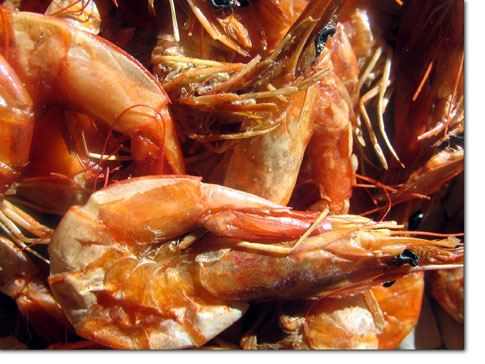|
|
||
|
The last supper
by Chef Boy Ari ’m in a restaurant in Salvador da Bahia, Brazil, trying to translate the concept of “death row” into Portuguese. I’m trying to explain to my friend Eli why it is that, even though a concave ceramic roof tile filled with fried fish has already been ordered, I just ordered a plate of fried shrimp with garlic sauce as well. Salvador is one of Brazil’s oldest cities, and its first capital. The history of Salvador is as rich and multilayered as the polyrhythmic afro-samba that wafts through the same hot air that carries the fragrance of cloves, hibiscus flowers and boiling dende – the rich palm oil used to make acaraje, balls of deep-fried bean paste stuffed with smoked shrimp and hot pepper sauce. More than 3.5 million Africans made landfall here before being dispersed to other parts of Brazil, making Salvador the center of Brazil’s slave trade. Many of those slaves stayed on, helping to make Salvador the blackest city in the Western hemisphere. Today, Salvador is the center of Brazil’s black-pride movement, known as negritude. The term negão, which means “big black person,” is meant as a compliment, as in “Hey negão, what’s going on?” The most popular band at the moment is called Afrodisiaco, a play on the Portuguese spelling for aphrodisiac. Despite the currently high status of blackness in Salvador’s mainstream culture, racial tensions remain unresolved, in the form of continuing color-based inequality. Most of Salvador’s wealth is concentrated in the hands of a small and decidedly lighter-toned minority, and poverty-driven crime always lingers disconcertingly close at hand. Lively neighborhoods – beehives of children at play, adults at gossip, pulsing music, the buzz of commerce – turn menacing as night falls. The streets empty out and the people lock themselves inside houses behind walls. Here in Salvador da Bahia, the law of the jungle is alive and well. I’m translating “death row” to my friend Eli in the course of explaining a factoid I just read in the new Tom Robbins book, Wild Ducks Flying Backward. Robbins says that fried shrimp is the meal most often requested by death row residents as their final meal. While I’m lucky enough to know that fried shrimp is indeed a bona fide and certified route to gastronomic heaven – no executioner necessary – I have a feeling that the popularity of fried shrimp on the eve of legally sanctified murder says more about the demographics of death row inmates than about the dish itself. The states where shrimp are a big part of local cuisine are the gulf states: Texas, Mississippi, Alabama, Florida and Louisiana. These are places filled with poverty-stricken residents, many of whom are incarcerated, many of whom are on death row. If my home state of Montana, by contrast, were to exterminate enough prisoners, perhaps chicken-fried steak would surpass fried shrimp as the most requested last supper. When the fried shrimp arrives at our table, drenched in garlic sauce, my mouth maxes out. Full of rich ocean flavor and the brilliant taste-tone of barely cooked garlic, we enter the realm where attempts at comparison on the culinary scorecard are pointless. The next day we go to an open-air market called Feira de Sao Joaquin. It’s a twisted maze of stalls, smelling of cinnamon, old meat, fresh fruit, incense and the sweat and grime of centuries layered thick like toe cheese in the labyrinthine nooks and crannies. We are searching for cashews and smoked shrimp I can take with me upon my inevitable return home. Scattered among the walls and displays of the stalls, back-lit photographs of a similar market in Angola are visible, part of a government-sponsored art exhibit. Next to a stall selling a rainbow assortment of tiny hot peppers, for example, is a picture of a pepper vendor in Angola. Amid the organized clutter of mortars and pestles, terra cotta bowls, wooden spoons, oil lamps and other such household goods is a photograph of the stall’s Angolan equivalent. A small sign at the entrance to the market explains that in the Angola market, concurrent with the display here, photos are posted of Salvador’s Feira de Sao Joaquin. If I hadn’t known that the pictures were of Angola I would have assumed they were taken here in Salvador. The people, the clothing, the piles of dried shrimp – it all looks like here. With freshly smoked shrimp in hand, we eat acaraje at a stall in the bowels of the market. The spicy fat of that savory doughnut sends us running for the coldest beers we can find, which disappear quicker than a pile of free tickets to the next Afrodisiaco show. For the next few days, shrimp are everywhere. Shrimp in coconut sauce, on skewers over fire, ground shrimp in vatapa, in the morning moqueca. I indulge with open heart and mouth, knowing full well that when I return to the land of chicken-fried steak, my diet will revert back to the ingredients local to the land of mountains, plains, pine forests and the sweet water of home. •
|
In this week's issue...
- December 18, 2025
- Let it snow
Although ski areas across the West have taken a hit, there’s still hope
- December 18, 2025
- Look, but don't take
Lessons in pottery theft – and remorse – from SW Colorado
- December 11, 2025
- Big plans
Whole Foods, 270 apartments could be coming to Durango Mall parcel


